EXPLANATORY NOTES
Data on births presented in this release were obtained from the Certificates of Live Birth (Municipal Form No. 102) that were registered at the Office of the City/Municipal Civil Registrars all throughout the country and forwarded to the Philippine Statistics Authority. Information presented include registered births which occurred from January to December 2020. The details in this special release are based on the usual place of residence of the mother.
More than 5,000 babies born to mothers residing in the City of Mandaluyong
The number of registered live births born to mothers residing in the City of Mandaluyong reached to 5,773 in 2020. On the average, 16 babies were born daily.
Over the last 15 years, the number of registered live births from 2006 to 2020 decreased by 17.1 percent. Year 2008 recorded the highest number of registered live births with 7,922 while year 2020 registered the lowest count with 5,773.

Year 2020 marks the start of COVID-19 pandemic. This phenomenon may have affected the number of live births in the City of Mandaluyong. Consequently, more babies were born before the pandemic.
Furthermore, 2,994 babies (51.9%) were male while 2,779 (48.1%) were female—resulting to a sex ratio of 108 males for every 100 females.
Highest occurrence of births recorded in October
On the average, 481 live births occurred every month. October recorded the highest birth occurrence with 565 (9.8%), followed by September and November with 560 (9.7%) and 530 (9.2%), respectively.
On the contrary, April recorded the lowest count with 395 (6.8%).

Almost all of live births delivered are medically attended
Out of 5,773 live births, 5,747 (99.5%) were medically attended, which may either be by physician, nurse, or midwife. On the other hand, 26 (0.5%) were delivered by traditional birth attendant, also known as hilot, or others.
In the Philippines, some local government units released ordinances prohibiting traditional birth attendants, or hilot, to deliver babies; babies shall be delivered by professional health practitioners in health facilities only.
About 30 babies are born outside hospital
In 2020, 5,741 (99.4%) babies were born in hospital. The remaining 32 were delivered at home or other places. Other places include vehicle, vessel, or airplane in transit within the Philippine territory (Civil Registration and Vital Statistics Handbook for Health Workers, 2016).
Average age of a woman giving birth is 28 years old
The age of the mothers ranged from 13 years old as the youngest to 50 years old as the oldest. On the average, a woman can give birth at the age of 28.
Across all age groups, about half the number of live births were born to mothers age 20 to 29 years old. This was followed by mothers age 30 to 39 years old with 2,136 (37.0%).
Meanwhile, eight (8) in every 100 live births were born to teenage mothers age 19 years old and below.

One (1) out of 10 live births are of low birthweight
Low birthweight is a condition where the weight of an infant at birth is less than 2.5 kilograms or 2,500 grams. It is associated with fetal and neonatal mortality and morbidity, inhibited growth and cognitive development, and non-communicable diseases (World Health Organization, n.d.)
In the City of Mandaluyong, it was recorded that 613 (10.6%) of babies born are of low birthweight. On the other hand, 5,149 (89.2%) babies weighed about 2,500 grams or more. The remaining accounted to those whose entries of birthweight in the Certificate of Live Birth is blank.

Seven (7) out of 10 babies are born out of wedlock
One thousand eight hundred sixty-five (1,865) or 32.3 percent of live births born to mothers residing in the City of Mandaluyong were legitimate. Under Article 225 of the Civil Code of the Philippines, children conceived or born during the marriage of parents are legitimate.
On the other hand, 3,908 (67.7%) babies were born out of wedlock.
Majority of births are timely registered
Around 5,000 (91.6%) live births were timely registered. According to Commonwealth Act No. 3753, Certification of Live Births shall be registered not later than 30 days after the birth. Beyond the reglementary period shall be considered late.
In 2020, not more than 500 live births (8.4%) were registered late.
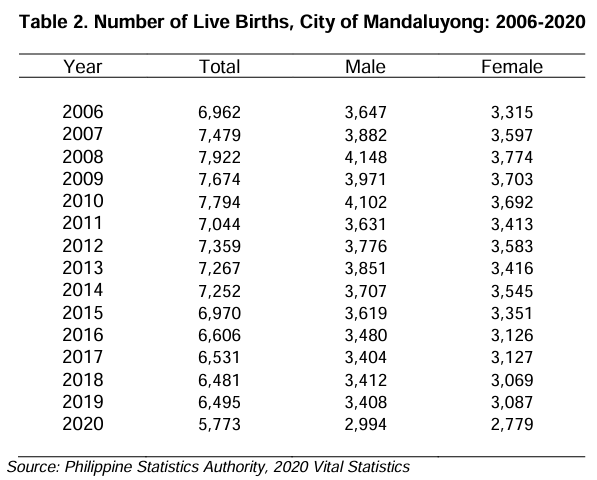

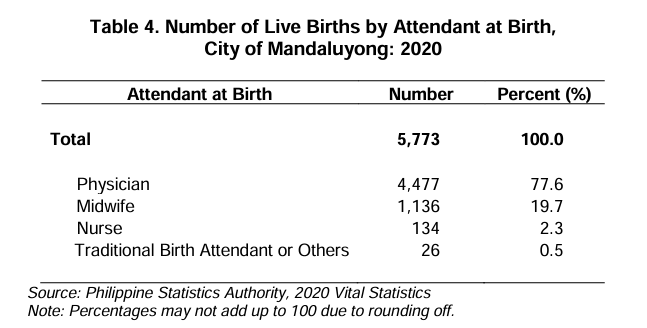
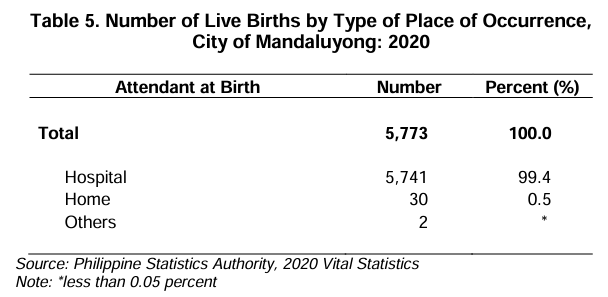
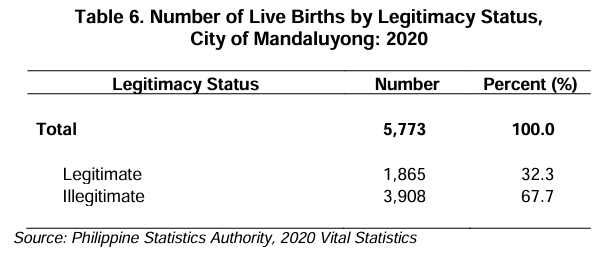
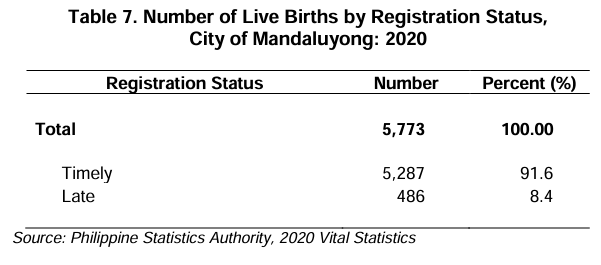
(SGD.) Danilo R. Cubinar
Chief Statistical Specialist
